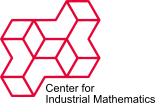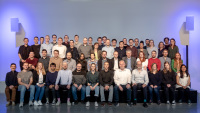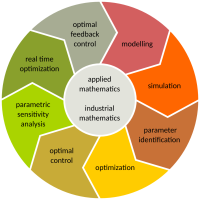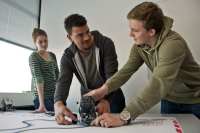WG Optimization and Optimal Control
Administration: Prof. Dr. Christof Büskens
The main focus of the working group for Optimisation and Optimal Control lies in the development of powerful numerical algorithms and their practical application in solving problems from research and industry.We pursue the goal of transferring state-of-the-art algorithms from mathematical research to application. To this end, we use algorithms of non-linear optimisation as well as data-based methodes of artificial intelligence.
Divided into specialized teams, we focus particularly on the following application areas:
Autonomous Systems
Highly accurate and at the same time efficient real-time control, precise perception of the environment through sensor fusion and intelligent autonomy through modern AI algorithms - these tasks are at the center of current research questions improving autonomous robotic systems. Taking autonomous driving as just one example, we investigate and develop new approaches to solutions for these topics and test them on real prototypes.
Highly accurate and at the same time efficient real-time control, precise perception of the environment through sensor fusion and intelligent autonomy through modern AI algorithms - these tasks are at the center of current research questions improving autonomous robotic systems. Taking autonomous driving as just one example, we investigate and develop new approaches to solutions for these topics and test them on real prototypes.
Energy and Environment
From the improved utilization of renewable energy to the reduction of CO2 and the optimization of existing processes in conventional power plants - in this domain we deal with current and application-oriented research questions from the fields of energy and environment. As diverse as the applications are, as diverse are the approaches to solutions from our mathematical expertise in the areas of parameter identification, data-driven modeling, optimization and optimal control.
From the improved utilization of renewable energy to the reduction of CO2 and the optimization of existing processes in conventional power plants - in this domain we deal with current and application-oriented research questions from the fields of energy and environment. As diverse as the applications are, as diverse are the approaches to solutions from our mathematical expertise in the areas of parameter identification, data-driven modeling, optimization and optimal control.
Maritim & Logistics
(Head: Dr. Christine Eis)
Safe and efficient maritime logistics with increasing complexity within global markets is the goal of this domain. Mathematical research from our core areas of optimal control, parametric sensitivity analysis, modelling and parameter identification helps to understand this complexity. As a link between mathematical research and our partners from the Maritime & Logistics domain, we enable innovations and lay the foundation for a modern maritime economy with assistance and automation systems.
Safe and efficient maritime logistics with increasing complexity within global markets is the goal of this domain. Mathematical research from our core areas of optimal control, parametric sensitivity analysis, modelling and parameter identification helps to understand this complexity. As a link between mathematical research and our partners from the Maritime & Logistics domain, we enable innovations and lay the foundation for a modern maritime economy with assistance and automation systems.
Creative Unit
The exploration of innovative research fields within the area of direct optimization as well as the development of reliable numerical methods are at the core of this domain. Our research interests range from parameter and system identification for dynamical systems over deep learning and artificial neural networks to optimal control and parametric sensitivity analysis.
The exploration of innovative research fields within the area of direct optimization as well as the development of reliable numerical methods are at the core of this domain. Our research interests range from parameter and system identification for dynamical systems over deep learning and artificial neural networks to optimal control and parametric sensitivity analysis.
Aerospace
(Head: Dr. Matthias Knauer)
The application of optimisation methods to different aspects of aerospace is the goal of this domain. This includes, for example, trajectory planning for rovers and spacecrafts, determining suitable constellations of satellites and software support for the design of components.
The application of optimisation methods to different aspects of aerospace is the goal of this domain. This includes, for example, trajectory planning for rovers and spacecrafts, determining suitable constellations of satellites and software support for the design of components.
Transfer
(Head: Dr.-Ing. Mitja Echim)
Thanks to the portfolio of own software, numerous third-party funded projects could be successfully acquired, especially in cooperation with industrial partners. This has decisively shaped the development and profile of the working group in recent years. A significant contribution to the transfer of knowledge to industry is realized by the newly founded transfer center TOPAS.
Thanks to the portfolio of own software, numerous third-party funded projects could be successfully acquired, especially in cooperation with industrial partners. This has decisively shaped the development and profile of the working group in recent years. A significant contribution to the transfer of knowledge to industry is realized by the newly founded transfer center TOPAS.




